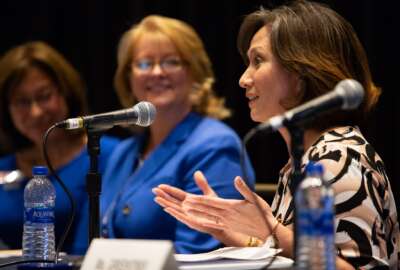For decades, job-hunting spouses of mobile military and federal people have hidden, or tried to hide, the fact that they are not “career” material because of the person they married. Many employers are reluctant to hire, train and promote someone who will be relocating in the coming years. Maybe sooner if an emergency happens. And that will happen again and again over several decades. In many cases — especially with military families — two incomes are a must. Yet difficult, and sometimes impossible.
But things may be changing thanks to new military spouse preference rules.
Job-expert Kathryn Troutman, president of The Resume Place, has a new book aimed at military spouses looking for good, career-level jobs. Recent rules changes should make it easier for them to get decent jobs and stop hiding or downplaying the fact they are part of a mobile military-federal marriage. The trick is knowing the new rules and format changes and to learn how to make your individual resume stand out. She is also the author of the Federal Resume Guidebook, the first ever book on federal resume writing, and the number two resume book in the country. She’ll be my guest today at 10 a.m. EDT on Your Turn here on Federal News Network or in the Washington D.C. area on 1500 AM. If you have questions, email them to me before showtime at mcausey@federalnewsradio.com . The show will also be archived on our home page so you can listen anytime. Tell a friend in your job-hunting community!
In the meantime, here are some of the 12 job hunting secrets we will be talking about:
- Secret #1: There is no more registration for federal jobs with the Priority Placement Program for Spouses (PPP-S) or any other program. PPP-S, which was a program to get military spouses into Department of Defense (DoD) positions, went away April 1. If previously registered in PPP-S, participants were deactivated on that date and can now use USAJobs to apply to any position for which they feel qualified.
- Secret #2: Documents are important: Military spouses must upload their service member’s PCS Orders, their Marriage Certificate, and for DoD jobs, the PPP Checklist into USA-Job’s application system to utilize the MSP hiring authority. Even if an applicant is very qualified, missing paperwork makes them ineligible.
- Secret #3: Military spouses can apply to “Federal Employee” announcements on USAJobs that allow military spouse applicants. The key here is to search for a green widget on the job posting that looks like two wedding rings hooked together. That’s the sign that military spouses are eligible for that particular opening.
- Secret #6: With “Military Spouse” and “Federal Employee/Military Spouse” positions, Veterans’ Preference is not applied. With the Military Spouse and Federal Employee announcements there is an equal playing field among the applicants: Federal employees, VEOA veterans, Military Spouses, Schedule A applicants – all all of the other Special Hiring Authorities.
- Secret #8: Military Spouses can add their PCS military career history to their federal resumes. That way, they will be easily identified as a Military Spouse and gaps in their work history will be understood. This is a new idea developed by author Kathryn Troutman. She was looking for a way to make the resumes of military spouses stand out. Her book, The Stars Are Lined Up for Military Spouses for Federal Careers, 2nd ed., provides six excellent sample fed resumes that show how military spouses can best present their atypical background that is dedicated to the military service career.
- Secret #10: Another improvement: EO-13473 can be used the entire time at each installation, instead of the former two years. Troutman notes that the original rules were very difficult. The spouse had to get family situated and adjusted, and also land a job in two years on base. No more!
Nearly Useless Factoid
By Alazar Moges
The idea of a dentist chair is an unpleasant one for most. Not as bad as the electric chair, but pretty bad. There is however a common thread with those two chairs. Alfred P. Southwick, the man credited with inventing the electric chair, was himself a dentist.
Source: History.com
Copyright
© 2025 Federal News Network. All rights reserved. This website is not intended for users located within the European Economic Area.



